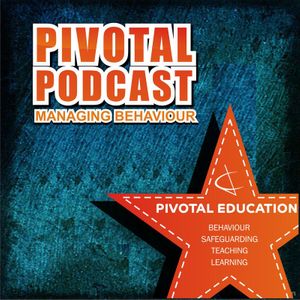Laura Henry on Starting Right, Baseline Testing and the Seeds of Behaviour – PP88
Pivotal Podcast - A podcast by Pivotal Education

Categories:
It was great to speak to Laura Henry this week about many different aspects of Early Years. Laura is an expert, international award-winning Early Childhood trainer and consultant, vice-president of Early Education and national representative for the World Forum in Early Care and Education. For three decades Laura has used her skills to support those who work directly with children. She is a highly regarded and popular trainer and writer. She is passionate about quality in Early Childhood, making sure that children receive the best possible care and education to help them reach their full potential. Laura regularly contributes to education and parenting publications. Laura has been on the judging panel for Nursery World and Nursery Management Today awards. She has used her specialist knowledge to work with government departments as well as national and international organisations, forums and working parties. She has worked within the education, health and social services sectors, performing a wide range of roles such as teacher, education inspector and curriculum manager within a large college. Laura is also the founder of NEYTCO, a Community Interest Organisation who have three main aims, mutual support, a platform to bring all Early Years Trainers and Consultants under one roof and a one-stop-shop for those who require an Early Years Consultant and/or Trainer to access an expert professional database. Laura is the mother of two grown-up sons, which is why she is able to speak from the heart to parents and all those who care for or educate children. Sowing the seeds of behaviour in the earliest days Laura always starts with the child and seeing the child as a unique individual. No matter what behaviour a child is displaying, every child has something which can be celebrated. Also it’s important to look at the relationships adults have with children. How are adults setting the scene for great behaviour? It’s important for adults to know the children very well and have a grounding in philosophical practice. In Early Years settings, the environment is also very important – is it stimulating, is it age-related, is it sensory-rich? So Laura prefers to talk about whether the environment is helping children to reach their potential rather than talking about ‘great behaviour’. Managing behaviour? Laura believes that we shouldn’t talk about adults managing children’s behaviour but rather about how we give children the tools and techniques so that they are able to self-regulate their own behaviour. Some of Laura’s thinking has been influenced by the High Scope approach. We need to be very careful around how adults support children who may be going through ‘choppy waters’ – for example, parents need to be able to differentiate between misbehaviour and stress behaviour. Is there a place for negative consequences in Early Years settings? Laura feels there is no place for negative consequences in the Early Years. She believes that, based on research and good practice, we should be having conversations around positive discipline. We should think about it from a three or four-year-old’s point of view. TV so-called behaviour experts use a method a ‘time out’ but Laura prefers to think about ‘time in’ which was suggested by